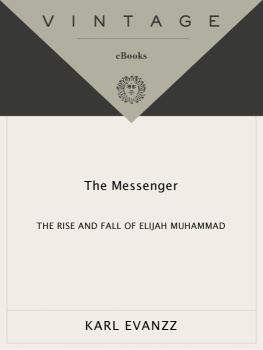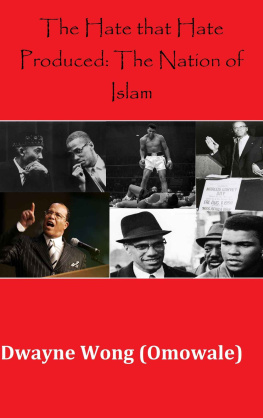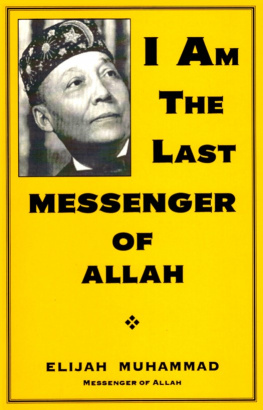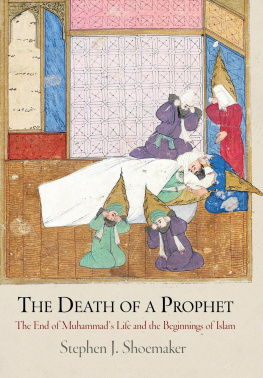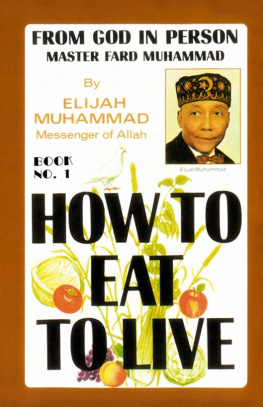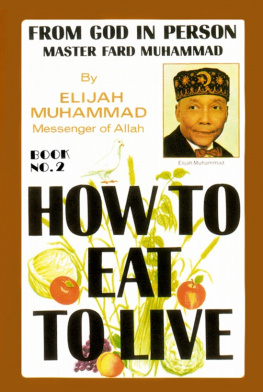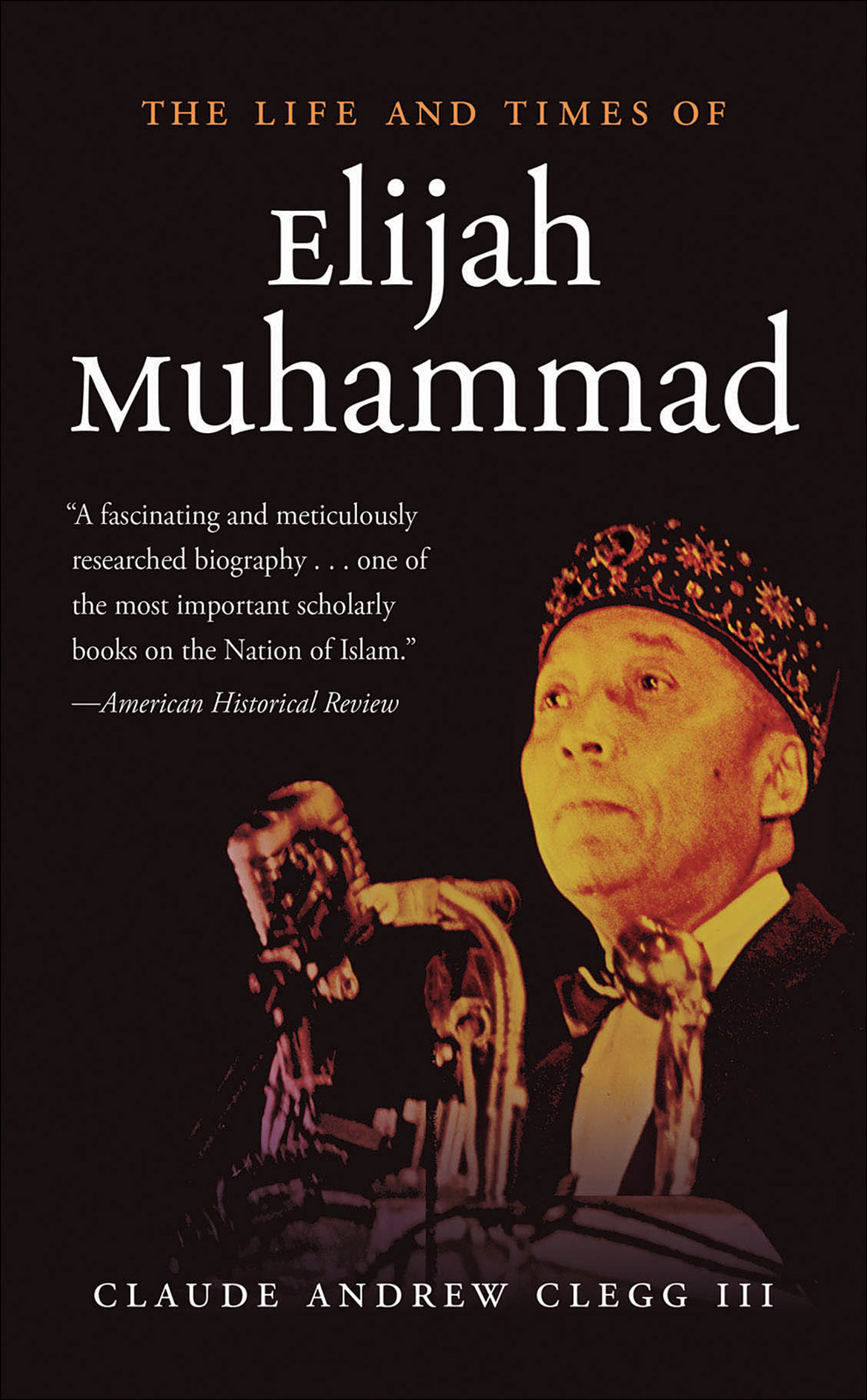
Contents
THE LIFE AND TIMES OF
ELIJAH MUHAMMAD
1997 Claude A. Clegg III
All rights reserved
Designed by Gretchen Achilles
Manufactured in the United States of America
Originally published as An Original Man: The Life and Times of Elijah Muhammad by St. Martins Press in 1997.
University of North Carolina Press edition published in 2014.
The paper in this book meets the guidelines for permanence and durability of the Committee on Production Guidelines for Book Longevity of the Council on Library Resources.
The University of North Carolina Press has been a member of the Green Press Initiative since 2003.
The Library of Congress has cataloged the original edition of this book as follows:
Clegg, Claude Andrew III.
An original man : the life and times of Elijah Muhammad / by Claude Andrew Clegg III1st ed.
p. cm.
Includes bibliographical references and index.
1. Elijah Muhammad, 1897-1975. 2. Black MuslimsBiography. 3. Afro-AmericansBiography. I. Title.
BP223.Z8E42 1997
297'.87'092dc20
[B] 9644692
CIP
ISBN 978-1-4696-1805-0 (pbk: alk. paper)
ISBN 978-1-4696-1806-7 (ebook)
18 17 16 15 14 5 4 3 2 1
Publication of this book is enabled by a grant from Figure Foundation
To the ending of mans
inhumanity to man

CONTENTS
PREFACE
His followers knew him as the Messenger of Allah. His detractors, none of whom could ignore his profound influence on others, denounced him as a cult leader, a black supremacist, and a hate teacher. Those who admired him but would not follow him called him the Honorable Elijah Muhammad. Reporters typically addressed him as either Mr. Muhammad or by his surname alone, even when they wrote unflattering stories about him and his movement. The numerous other cognomens and aliases by which he went served mostly utilitarian purposes, such as confusing government surveillance agencies or shielding the leader from undesirable public scrutiny. Only his most bitter enemies referred to him as simply Elijah or by his slave name of Pooleinsults resorted to most often by his religious opponents.
Each of these names, labels, and salutations conjured up particular images of Elijah Muhammad and his leadership. Some of the images were meant to stigmatize him and diminish his influence; others were self-serving illusions that he had created and fostered for certain purposes. Despite this range of designations, no single term or phrase completely captured the essence of his life or significance. He was much larger and more complex than mere names and phrases, notwithstanding the countless attempts to reduce him to such.
Given his relevance to the evolution of black nationalist and religious thought in the twentieth century, Elijah Muhammad has unfortunately been the subject of few monograph-length studies. Until now, his life and work have been mired in simplistic popular images and distortions. To be sure, Muhammad has not entirely escaped the historians attention. Several works, including books, articles, and dissertations, have examined the Nation of Islam. However, Muhammad and his historical importance have still suffered, in many ways, from a surprising degree of scholarly neglect, which has often vitiated his role in shaping American Islam and African-American racial consciousness. The earliest books on the movement appeared in the early 1960s, followed by a spate of articles and other writings, which made the Muslims a somewhat vogue, if controversial, topic of discussion, not unlike the explosion of interest that the image and words of Malcolm X enjoy today. Yet, following the departure of Malcolm X from the Nation in the winter of 1963-64, scholarly and journalistic interest in the movement markedly declined. From then until the present, academic and nonmember writers have studied, almost without exception, the separatist organization only in reference to the life and experiences of Malcolm X and, to a lesser degree, Louis Farrakhanthe Nation of Islam inspiring little of the literature in and of itself. None of the later works have dealt at length with the impact of Muhammads early experiences on his leadership style and ideological moorings during the 1960s and 1970s.
Consequently, this biography seeks to capture the life and meaning of Elijah Muhammad, the man and the leader, and to understand him within his historical context. Toward these ends, this critical analysis advances three major themes of crucial importance in explaining the leaders life, views, and leadership. The first of these is his seminal role in the evolution of black nationalism and Islam as an alternative religion among African-Americans in the twentieth century. In particular, An Original Man will not only show that Muhammad was the most prominent icon of the quasi-Islamic and racial separatist movements that developed among blacks following World War II, but also that he personally was the main guiding force behind the beliefs, rituals, and functions of the Nation of Islam for over four decades. From his feeling of personal persecution, which he acquired early in life, to the organizational triumphs and crises of the 1960s and 1970s, the experiences and philosophy of Muhammad were fundamental to the fashioning of the Nation of Islam as a significant separatist movement in the United States. In sum, to understand the nature and appeal of varieties of Islam and black nationalism to African-Americans over the past fifty years, one must examine the life and work of Elijah Muhammad. His leadership illuminates the importance of leaders before him, such as Marcus Garvey and Noble Drew Ali, and those who came after him, including Louis Farrakhan and Warith D. Mohammed.
Secondly, economic factors had a crucial impact on both Muhammads leadership and the maturation of the Nation of Islam. Circumstances and conditions, such as Muhammads agrarian background and experiences in depressed Detroit during the 1920s and 1930s, were directly tied to his later attraction to the Nation of Islam as a vehicle of financial uplift as well as spiritual and racial empowerment. Furthermore, material considerations progressively overshadowed purely spiritual matters, which led to conservatism in the movement. The emphasis on economics was not necessarily a contradictory element in the ideological development of the Nation of Islam and can be traced to the founding of the organization during the Great Depression. In fact, thousands of African-Americans were attracted to the movement because of its willingness to address both eschatological and earthly concerns. However, the experiments of the Muslims in real estate and entrepreneurship after World War II had a drastic impact on both the fortunes and ideological underpinnings of the movement. The fiscal dealings of the Muslim leadership led, by the 1950s, to individual acquisitiveness, even avarice, that routinely consumed growing amounts of the groups resources. Consequently, the imperative to maintain economic expansion resulted in an aversion to both doctrinal innovation and various forms of activism. While this book does not maintain that Elijah Muhammads role in the Nation of Islam was solely motivated by materialism, his leadership, and the movement in general, were increasingly shaped by both a stress on material concerns and the larger economic patterns behind American society.
Thirdly, to understand the life of Elijah Muhammad demands that he be placed in his historical environment. His rural Georgian background and acclimation to urban life will be detailed, as well as important national and international events and conditions. The various ideological influences and organizational dynamics that helped shape his philosophy and leadership will be assayed. The pervasive influence of government censure on Muhammads leadership is also of special interest, especially since state repression so proscribed the activism and protest strategies of the Nation.


